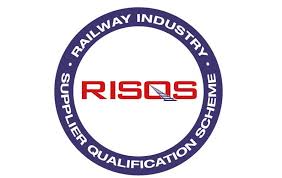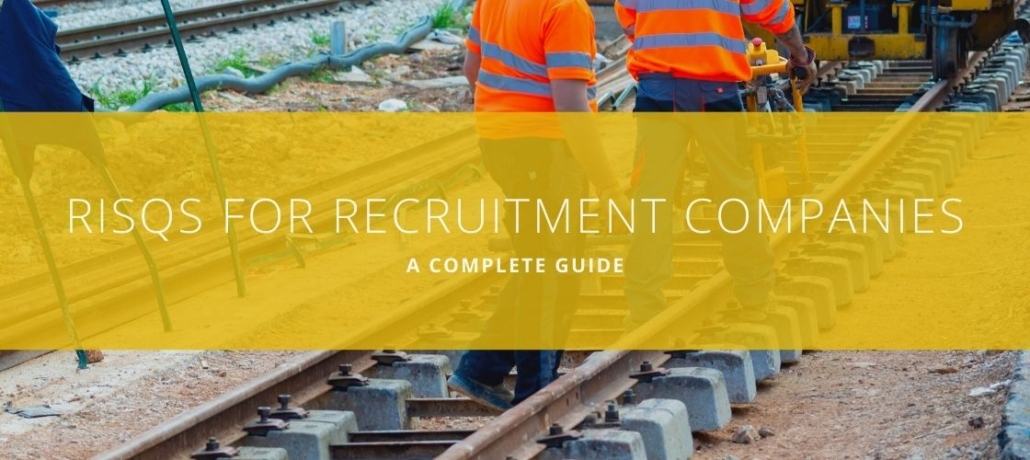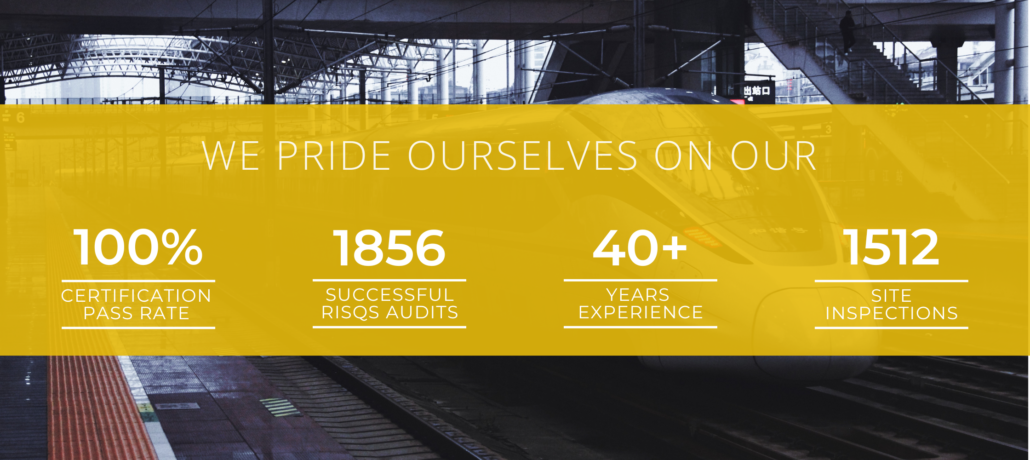RISQS CERTIFICATION FOR RECRUITMENT COMPANIES: A COMPLETE GUIDE
Introduction to RISQS Certification for Recruitment companies
RISQS certification for recruitment companies stands as a pivotal gateway into the dynamic landscape of the UK Rail Industry, ensuring adherence to rigorous safety and competency standards. For recruitment companies looking to provide human resources and personnel to the UK Rail Industry, obtaining RISQS certification is not just beneficial but often a necessity.
This comprehensive guide aims to illuminate the significance of RISQS certification for recruitment firms, delving into its importance, the certification process, audit procedures, essential considerations, and the specific functionalities RISQS provides, including Sentinel and its management system.

What is RISQS and why is certification necessary for recruitment companies?
RISQS, formerly known as Achilles Link-up, is the UK Rail Industry’s supplier assurance scheme. It serves as a central qualification management service, providing buyers with a pool of pre-qualified suppliers, including recruitment agencies.
RISQS certification assures rail industry stakeholders that suppliers, including recruitment companies, comply with rigorous industry standards, particularly concerning health, safety, and competency requirements.
For recruitment companies, obtaining RISQS certification opens the door to lucrative opportunities within the UK Rail Industry. It signifies credibility, competence, and commitment to safety standards, thus enhancing trust among potential clients.
Moreover, most rail industry contracts mandate RISQS certification as a prerequisite for supplier engagement, making it indispensable for recruitment firms aspiring to operate within this sector.
Understanding RISQS for Recruitment companies: Sentinel and Management System
RISQS serves as a central management service for the UK Rail Industry, ensuring that suppliers, including recruitment agencies, comply with rigorous industry standards. At the core of RISQS lies Sentinel, a robust system designed to streamline the management of workforce competence and safety certification. Sentinel offers several key functionalities essential for recruitment companies operating within the rail sector:
Competence Management:
Sentinel provides a comprehensive platform for managing the competence of rail industry workers. Through Sentinel, recruitment companies can track the qualifications, certifications, and training records of personnel, ensuring they meet the requisite standards for their assigned roles.
Safety Certification Tracking:
Safety is paramount in the rail industry, and Sentinel facilitates the tracking of safety certifications for personnel. From trackside safety certification to medical assessments, Sentinel enables recruitment companies to ensure that workers possess the necessary certifications to perform their duties safely and effectively.
Workforce Deployment:
The management system within Sentinel allows recruitment companies to efficiently deploy personnel to various rail industry projects. By centralising workforce data and availability information, Sentinel enables recruiters to match personnel with appropriate job opportunities, optimising workforce allocation and project staffing.
Compliance Monitoring:
RISQS certification entails ongoing compliance with industry standards, and Sentinel plays a crucial role in facilitating compliance monitoring. Through real-time access to workforce data and compliance records, recruitment companies can proactively identify and address any potential non-conformances, ensuring continuous adherence to RISQS requirements.
Audit Trail Documentation:
In the event of audits or regulatory inquiries, Sentinel provides a comprehensive audit trail documenting personnel qualifications, certifications, and training histories. This not only streamlines the audit process but also enhances transparency and accountability, demonstrating a commitment to regulatory compliance and industry best practices.
Commonly Recruited Roles in the UK Rail Industry
Understanding the key roles in the UK Rail Industry is pivotal for recruitment companies seeking RISQS certification. Among the most commonly recruited positions are:
- Rail Engineers: Responsible for the design, construction, and maintenance of railway infrastructure.
- Safety Critical Workers: Including signallers, controllers, and track workers, essential for ensuring the safe operation of railways.
- Project Managers: Overseeing various rail projects, from infrastructure upgrades to new constructions.
- Maintenance Technicians: Skilled individuals tasked with the upkeep and repair of railway assets.
- Operational Staff: Encompassing train drivers, station staff, and ticket inspectors, vital for the day-to-day functioning of rail services.
The RISQS Certification Process for Recruitment Companies
The journey towards RISQS certification involves several steps:
- Registration: Recruitment firms must register with RISQS and complete the necessary documentation.
- Pre-Assessment Preparation: This phase involves internal review and preparation to ensure compliance with RISQS standards.
- Audit: An independent assessment conducted by RISQS auditors to evaluate the recruitment company’s adherence to industry requirements.
- Corrective Actions: If any non-conformances are identified during the audit, the recruitment company must address them promptly.
- Certification: Upon successful completion of the audit and resolution of any issues, the recruitment company receives RISQS certification, valid for a specified period.
The RISQS Audit Process for Recruitment Companies
During the audit, RISQS assessors examine various aspects of the recruitment company’s operations, including:
- Compliance Documentation: Reviewing policies, procedures, and records to ensure alignment with industry standards.
- Competency Assessment: Evaluating the recruitment company’s processes for vetting and verifying the competence of supplied personnel.
- Health and Safety Practices: Assessing adherence to health and safety regulations, including risk assessment procedures and training protocols.
- Quality Management: Reviewing the recruitment company’s quality management system to ensure effectiveness and continuous improvement.
Important Considerations
As recruitment companies embark on their RISQS certification journey, several crucial considerations require attention:
- Commitment to Compliance: Maintaining ongoing compliance with RISQS standards is essential to retain certification.
- Continuous Improvement: Embracing a culture of continuous improvement ensures that recruitment processes evolve to meet changing industry requirements.
- Communication with Clients: Transparent communication with clients regarding RISQS certification status fosters trust and enhances business relationships.
- Resource Allocation: Adequate resources, including time and personnel, should be allocated to support RISQS compliance efforts effectively.
Conclusion
Achieving RISQS certification is not merely a regulatory obligation but a strategic imperative for recruitment companies seeking to thrive in the UK Rail Industry. By adhering to stringent industry standards, recruitment firms not only enhance their marketability but also contribute to the overarching goal of ensuring safety and efficiency within the rail sector.
With a clear understanding of the certification process, audit procedures, and essential considerations, recruitment companies can embark on their RISQS certification journey with confidence, poised for success in this dynamic and vital industry.
This guide aims to equip recruitment companies with the knowledge and insights needed to navigate the complexities of RISQS certification, empowering them to establish themselves as trusted partners within the UK Rail Industry.







